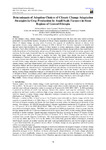Determinants of Adoption Choices of Climate Change Adaptation Strategies in Crop Production by Small Scale Farmers in Some Regions of Central Ethiopia

View/
Date
2014Author
Balew, Solomon
Agwata, Jones
Anyango, Stephen
Metadata
Show full item recordAbstract
In Sub-Saharan Africa, climate change is set to hit the agricultural sector the most and cause untold suffering particularly for smallholder farmers. Adoption of climate change adaptation strategies aims to minimize adverse effects of climate change on crop yields. However, the capacity of smallholder farmers to choose from appropriate climate change adaptation strategies in SSA is limited. It is therefore imperative to identify and analyze factors that determine the capacity of these farmers to choose appropriate climate change adaptation strategies. Such effort will help policy makers and development practitioners design policies that would help to tackle the problem of food insecurity and poverty afflicting majority of the local people in various regions in the continent. In this study, household data on crop farming systems in central Ethiopia was used and binary and multinomial logit models developed to analyze the data. The binary logit model was used to identify determinants of farmers’ decision to adapt to climate change at all. The multinomial logit model was employed to analyse factors that affect farmers’ adoption choices. Results indicate that farmers´ decisions to choose from several climate change adaptation strategies are influenced by various factors such as access to information on climate change, input and output market, credit facility, extension services and social capital. The implication is that policy makers and development practitioners should focus on improving information flow, access to input and output market, the education level of the household head, and informal social networks that can speed up the adoption of adaptation strategies. The multinomial logit model also shows that farmers´ decision to choose among climate change adaptation strategies is influenced by the type of risk factor they faced and the occurrence of drought or flood. Accordingly, policy makers and development practitioners should play a significant role by promoting adaptation methods appropriate for particular climate change risk factor such as drought or flood.
